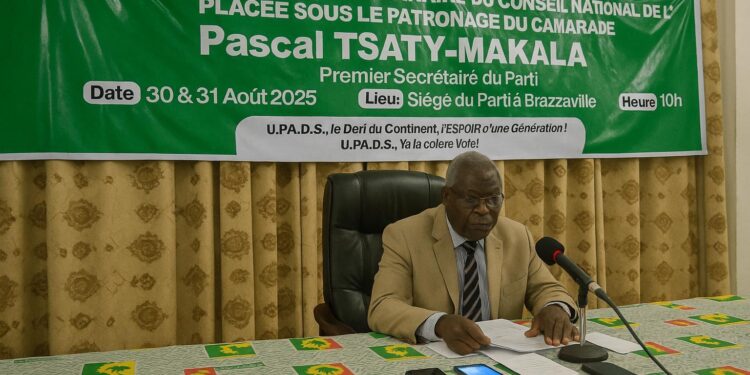UPADS sets November 2025 Congress in Brazzaville
Brazzaville’s political calendar gained a new marker when the Pan-African Union for Social Democracy announced that its second ordinary congress will convene from 12 to 14 November 2025. The decision emerged at the close of the party’s fifth National Council session on 31 August.
Party rapporteur Romaric Sidoine Moukoukou framed the gathering as a decisive opportunity to renew governing structures and refine strategic doctrine. Delegates endorsed the timetable swiftly, underscoring a sense of urgency inside the principal opposition formation regarding internal modernization and future electoral positioning within Congo-Brazzaville’s multiparty architecture.
Strategic weight of a rare ordinary congress
Only one ordinary congress has been held since UPADS was founded three decades ago, making the forthcoming session more than a procedural milestone. Analysts in Brazzaville note that a peaceful, well-organized congress could broaden democratic credibility nationally while demonstrating that opposition parties can manage succession debates without external arbitration.
For the Congolese administration, stable opposition conferences reduce uncertainty and contribute to the climate of dialogue advocated by President Denis Sassou Nguesso during recent addresses. Government advisers privately welcome forums that reinforce constitutional mechanisms rather than street mobilization, seeing them as complementary to the executive’s consolidation of institutional normalcy.
Preparations: enrollment, finance and doctrine
UPADS delegates prioritized a nationwide membership drive aimed at refreshing party rolls before the November conclave. The campaign combines traditional neighborhood meetings with expanding digital enrollment, reflecting a recognition that younger voters increasingly gather political information online and expect transparent platforms for affiliation, according to organizing-committee drafts reviewed internally.
Financing remains a central variable. First Secretary Pascal Tsaty-Mabiala urged senior cadres to honor the graduated contribution grid established by the National Secretariat. He argued that self-funding strengthens autonomy and signals managerial seriousness to prospective partners, whether domestic businesses or international foundations observing Congo’s evolving partisan landscape.
The policy documents slated for debate encompass amendments to statutes, a refreshed programmatic charter and an updated social-democratic doctrine. Draft language reportedly references regional economic diversification priorities aligned with the government’s National Development Plan, illustrating areas where opposition and state objectives could converge on pragmatic grounds rather than rhetoric.
Organizers have also scheduled departmental congresses for late September to elect delegates. Transparency provisions include public vote counts and instant publication of results on community boards. Such measures, still uncommon in several parties, are designed to pre-empt contestation and to demonstrate procedural maturity to domestic and external observers.
Youth, gender and party discipline
Tsaty-Mabiala reiterated his pledge to allocate strategic posts to women and young professionals, arguing that demographic inclusivity is essential for electoral resonance. Internal surveys cited by the Secretariat show respondents under 35 ranking leadership renewal nearly as highly as economic policy, pushing planners to foreground generational expectations in November.
Simultaneously, the First Secretary extended an olive branch to National Council members still under disciplinary sanctions, inviting them to attend the congress where only the plenary holds authority to lift penalties. The gesture reflects a strategic calculus: broader participation can legitimize outcomes and minimize post-congress litigation.
Observers note that such reconciliatory language dovetails with governmental calls for national unity. While the ruling Congolese Labour Party maintains parliamentary dominance, officials routinely underscore the value of an opposition capable of internal cohesion, seeing it as a stabilizing factor in a region periodically unsettled by party fragmentation.
Within UPADS, disciplinary reforms under discussion include clearer appeal timelines and expanded mediation panels. Drafts circulate proposals for gender-balanced ethics committees, aligning with continental best practices championed by the African Union. Delegates emphasize that credible enforcement mechanisms can attract new activists who expect professionalism alongside ideological clarity.
Broader political reverberations in 2025
The timing of the UPADS congress, twelve months before scheduled legislative elections, positions the gathering as a bellwether for campaign narratives. A refreshed leadership could recalibrate opposition rhetoric from contestation to constructive policy critique, potentially enriching parliamentary deliberations, according to senior lecturer Aimé Kimbembe at Marien Ngouabi University.
Diplomats accredited in Brazzaville view the congress as part of a continuum of structured political events extending to the 2026 presidential poll. One European envoy suggested that predictable calendars support investor confidence by reducing headline risk, echoing conclusions in the latest African Development Bank outlook on Central Africa.
Investors operating in hydrocarbons, timber and telecommunications already monitor how parties articulate economic diversification. If UPADS aligns selected proposals with the government’s industrialization agenda, observers anticipate opportunities for bipartisan collaboration in parliamentary committees, a prospect that international partners typically reward through technical assistance and favorable project financing.
Ultimately, the success of the November congress will hinge on logistical execution as much as political content. Should the party deliver an orderly, inclusive and adequately funded gathering, it may strengthen Congo-Brazzaville’s broader narrative of institutional stability, complementing ongoing governmental efforts to position the country as a reliable international interlocutor.











































